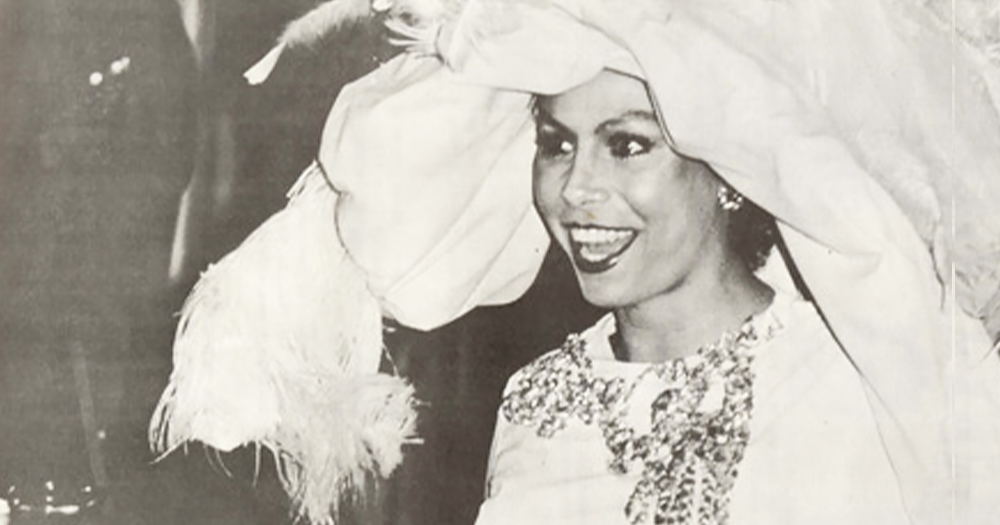On November 16 this year, entertainer, trans activist, and stand-up comedian Lady Java passed away at 82. A few publications reported on the passing, but it seemed that the queer community at large was unaware. Outside of Los Angeles, California, Sir Lady Java was widely unknown; despite her countless talents and her role in queer liberation, she wasn’t a household name like Marsha P Johnson, or Harvey Milk.
Born in New Orleans, Lady Java transitioned early on in her life and began her career as a performer at the local nightclubs. Her mother showed nothing but support for her daughter and even waited up most nights to make sure she had made it home safely.
An Icon Forever. RIP Sir Lady Java. 🏳️⚧️ ✊🏽 💔❤️🩹 pic.twitter.com/CcheTVc3rv
— Vanessa Clark (@FoxxyGlamKitty) November 17, 2024
After making some money with her work as a fashion designer and hat maker, Java moved to Los Angeles to pursue a greater stage. She made space for herself by go-go dancing and performing drag amongst some of the brightest up-and-coming comedians and stage acts such as Flip Wilson, Richard Pryor, Etta Marcus, and John Elroy Sanford a.k.a Redd Foxx.
With her sweeping dresses and dazzling smile, Sir Lady Java doubled lines for the clubs she performed at, and brought lustre to LA nightlife. Magazines such as Sepia even featured her on their covers to sell copies. But, because she was a trans woman of colour, she had no choice but to fight to keep the success she earned.
Sir Lady Java 1960s
The first trans woman of color in mainstream Hollywood . pic.twitter.com/VdQjKuQJZf— HailieSahar (@213Sahar) November 15, 2020
Sir Lady Java championed LGBTQ+ rights before there was a movement or community to stand behind her. In the 1960s, the self-proclaimed female impersonator went head to head against rule #9, a law banning anyone from performing on stage as the opposite sex to the one they were assigned at birth. As a pioneer of drag with notoriety, Java was targeted by the police.
Because law enforcement in America profiled BIPOC and LGBTQ+ communities, and still do to this day, Lady Java was thrust into the centre of the conflict with the LAPD. The police aimed to undo any of the diversification of the past decades and force queer performers to adhere to the strict rules. Instead of taking the abuse, she took to the streets and fought for Black trans rights.
The cops targeted clubs with majority Black patronage while allowing similar female impersonator performances to run undisturbed in clubs with mostly white customers. The Red Foxx was one of the black-owned businesses in LA that fell victim to this crusade. After waiting tables at the nightclub when she had first moved to town, Java had a successful stint of drag and comedy shows there.
During the enforcement of rule #9, The Redd Foxx applied for the permit that would have allowed Sir Lady Java to perform, and it was quickly denied. After receiving a judicial notice for continuing to employ Java, The Red Foxx let her go. Seeing this as the discrimination it was, Java took her picket to The Red Foxx’s front entrance.
Sir Lady Java is a Black transgender activist and performer who organized public protests fighting for the rights of the Los Angeles LGBTQ community and protesting police harassment and trans discrimination in the 1960s and 1970s.
We honor her this #LGBTQHistoryMonth pic.twitter.com/po8d1aFjeB
— ACLU (@ACLU) October 28, 2022
With support from the American Civil Liberties Union, Java made her case to the Supreme Court. Unfortunately, the justices ruled that as a performer and not an establishment employing female impersonators, she had no standing to sue for the overturning of rule #9. The ACLU tried and failed to find a bar willing to sue on behalf of Sir Lady Java, and so the case was dismissed.
Despite the setbacks, Java was more vocal than ever and stood loud and proud as enemy #1 to rule #9. She played with gender expression on stage, seemingly transitioning between fem and masc personas. She mastered malicious compliance by wearing the required “male” garments along with her gowns and fascinators. She never backed down and fought against anti-trans legislation.
Although her case wasn’t successful, Lady Java paved the way for other employee discrimination cases, leading to protections for BIPOC and LGBTQ+ people under the law. Her contribution to the queer rights movement cannot be understated. Following a separate case in 1969, rule #9 was overturned, and a small part of the fight Sir Lady Java started came to an end.
Currently, there is a biopic about Sir Lady Java that is seeking funding, starring POSE actor Hailie Sahar, directed by Anthony Hemingway. In an industry that whitewashed Stonewall and fails to represent queer BIPOC stories, this film is a necessary piece of cinema.
View this post on Instagram
© 2024 GCN (Gay Community News). All rights reserved.
Support GCN
GCN is a free, vital resource for Ireland’s LGBTQ+ community since 1988.
GCN is a trading name of National LGBT Federation CLG, a registered charity - Charity Number: 20034580.
GCN relies on the generous support of the community and allies to sustain the crucial work that we do. Producing GCN is costly, and, in an industry which has been hugely impacted by rising costs, we need your support to help sustain and grow this vital resource.
Supporting GCN for as little as €1.99 per month will help us continue our work as Ireland’s free, independent LGBTQ+ media.
